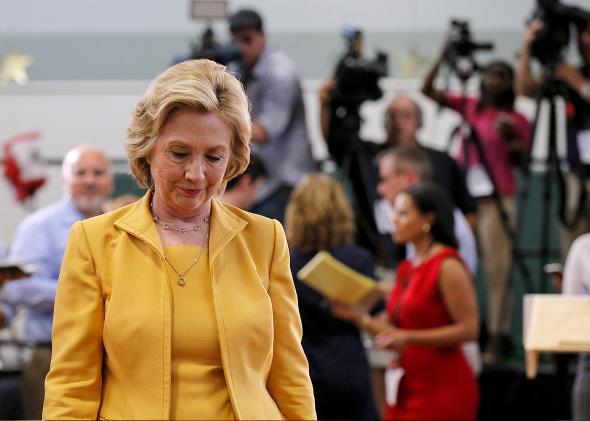When it comes to Hillary Clinton and her place in the presidential primary, the political media needs to start being able to hold two ideas in mind at once. The first, and most familiar to anyone who has followed this campaign, is that Clinton is vulnerable.
Her email—and use of a private server—has grown from a scandal to a fiasco. The FBI has stepped in with an investigation to see if Clinton’s system was compromised by foreign hackers, and to see if she knowingly passed classified information—including “top secret” intelligence—through her server. Clinton is also due to face a House select committee for a public hearing on the 2012 attack on an American consulate in Benghazi, Libya. Maybe she’ll perform well and avoid missteps. But she might stumble, exposing herself and her campaign to more attacks and scrutiny.
There have also been challenges on key policy questions. To the most vocal progressive activists, Clinton still needs to account for her role in the Bill Clinton White House on issues like mass incarceration, police militarization, and the drug war. As first lady, for example, she pushed the “three strikes” provision of the 1994 crime bill and supported greater prison time for offenders. “There is something wrong when a crime bill takes six years to work its way through Congress and the average criminal serves only four,” she said at the time. The same is true for her positions in the Senate, where she voted in favor of federal police funding that flowed to SWAT teams and other vectors for militarization. There’s also her economic record: As a senator from New York, she backed a 2001 bill that would become the much loathed (among liberals) 2005 bankruptcy law. And she still hasn’t acknowledged or apologized for the racially tinged rhetoric used by her campaign in the most heated moments of her 2008 race against Barack Obama.
But, again, this isn’t the whole story. There’s still that other idea about Clinton to keep in mind, even as we consider her problems and weaknesses: Clinton is winning the Democratic presidential primary, and it’s not even close.
Despite the reporting around it—which has treated her as a losing candidate—the latest Quinnipiac poll shows Clinton with a wide lead over her opponents. She wins 45 percent of the Democratic Party, to 22 percent for Vermont Sen. Bernie Sanders and 18 percent for Vice President Joe Biden. Aggregate polls show a similar picture; in the Huffington Post Pollster average, Clinton holds 48.9 percent of the primary vote, compared with 22.5 percent for Sanders and 12.5 percent for Biden. There’s no contest.
There’s an easy and obvious rejoinder: What about 2008? Wasn’t Clinton winning at this point in that primary; wasn’t she “inevitable”? And look what happened: She lost to a popular upstart with the public behind him.
This sounds persuasive, but it doesn’t fit the facts. As writer Harry Enten notes for FiveThirtyEight, Clinton was much weaker in the previous primary than she is now. “Back in 2008,” he writes, “she was trailing in early Iowa polls. She earned only a third of the vote in early New Hampshire polls and was below 40 percent nationally.” Now, by contrast, she’s well ahead in national polls, well ahead in Iowa, and only somewhat behind in New Hampshire.
Moreover, because primaries aren’t popularity contests, the most important measure of success is party support. Barack Obama wasn’t an upstart; behind his run was the party machinery, or at least the part that didn’t want Clinton. Today, where do Democratic fundraisers stand? What do Democratic interests groups think? How will Democratic lawmakers act?
On each score, Clinton isn’t just winning—she dominates. Most fundraisers are in her corner; it’s why Biden will have a hard time raising money if he decides to run. Interest groups are still quiet, but Democratic lawmakers are overwhelmingly pro-Hillary. Clinton has more than 100 endorsements from sitting Democrats, including seven governors and 29 senators. Biden, who doesn’t appear to have decided whether to run yet, has two. Former Maryland Gov. Martin O’Malley has one. Bernie Sanders has none. This is unprecedented. Not only is Clinton ahead of her previous endorsement total, according to analysis by FiveThirtyEight, but she’s racked up more endorsements of significance at this stage of the race than any nonincumbent Democratic presidential candidate, ever. At this point in 1999, for instance, Al Gore had two-thirds as many endorsement points (a measure that weights senators and governors more than House representatives) as Clinton does now; at this point in 2003, John Kerry had less than one-tenth Clinton’s current support; at this point in 2007, Obama had less than one-sixth. The closest analogue to Clinton isn’t anyone in the Democratic Party—it’s George W. Bush, who had much greater endorsement support than Clinton at this stage of the 2000 Republican presidential primary and ultimately won easily, despite an early challenge from John McCain.
Of course, life is arbitrary, and Hillary’s campaign could still fall apart. It’s not hard to imagine how it might happen: The FBI investigation could lead to indictments, ending Clinton’s campaign with a court appearance. Or, she could refuse to answer any questions on her previous positions and open space for a challenger.
Then again, neither email nor crime is an impossible albatross; other candidates have had worse. George H.W. Bush had to deal with fallout from Iran-Contra, while Al Gore had Bill Clinton’s impeachment in the background. Both won their respective nominations with little difficulty. Sure, Clinton could lose. But it’s hardly a live possibility.
